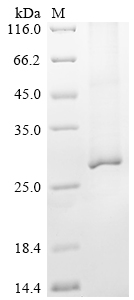Recombinant Mouse Aquaporin-2 (Aqp2)
CAT:
399-CSB-CF001962MO-02
Size:
20 µg
Price:
Ask
- Availability: 24/48H Stock Items & 2 to 6 Weeks non Stock Items.
- Dry Ice Shipment: No




Recombinant Mouse Aquaporin-2 (Aqp2)
- CAS Number: 9000-83-3
- Gene Name: Aqp2
- UniProt: P56402
- Expression Region: 1-271aa
- Organism: Mus musculus
- Target Sequence: MWELRSIAFSRAVLAEFLATLLFVFFGLGSALQWASSPPSVLQIAVAFGLGIGTLVQALGHVSGAHINPAVTVACLVGCHVSFLRAAFYVAAQLLGAVAGAAILHEITPVEIRGDLAVNALHNNATAGQAVTVELFLTMQLVLCIFASTDERRSDNLGSPALSIGFSVTLGHLLGIYFTGCSMNPARSLAPAVVTGKFDDHWVFWIGPLVGAVIGSLLYNYLLFPSTKSLQERLAVLKGLEPDTDWEEREVRRRQSVELHSPQSLPRGSKA
- Tag: N-terminal 10xHis-tagged
- Source: in vitro E.coli expression system
- Field of Research: Signal Transduction
- Assay Type: CF Transmembrane Protein & In Stock Protein
- Relevance: Forms a water-specific channel that provides the plasma membranes of renal collecting duct with high permeability to water, thereby permitting water to move in the direction of an osmotic gradient . Plays an essential role in renal water homeostasis .
- Purity: Greater than 85% as determined by SDS-PAGE.
- Activity: Not Test
- Length: Full Length
- Form: Liquid or Lyophilized powder
- Buffer: If the delivery form is liquid, the default storage buffer is Tris/PBS-based buffer, 5%-50% glycerol. If the delivery form is lyophilized powder, the buffer before lyophilization is Tris/PBS-based buffer, 6% Trehalose, pH 8.0.
- Reconstitution: We recommend that this vial be briefly centrifuged prior to opening to bring the contents to the bottom. Please reconstitute protein in deionized sterile water to a concentration of 0.1-1.0 mg/mL.We recommend to add 5-50% of glycerol (final concentration) and aliquot for long-term storage at -20℃/-80℃. Our default final concentration of glycerol is 50%. Customers could use it as reference.
- Molecular Weight: 30.5 kDa
- References & Citations: "Congenital progressive hydronephrosis (cph) is caused by an S256L mutation in aquaporin-2 that affects its phosphorylation and apical membrane accumulation." McDill B.W., Li S.Z., Kovach P.A., Ding L., Chen F. Proc. Natl. Acad. Sci. U.S.A. 103:6952-6957 (2006)
- Storage Conditions: The shelf life is related to many factors, storage state, buffer ingredients, storage temperature and the stability of the protein itself. Generally, the shelf life of liquid form is 6 months at -20℃/-80℃. The shelf life of lyophilized form is 12 months at -20℃/-80℃.
